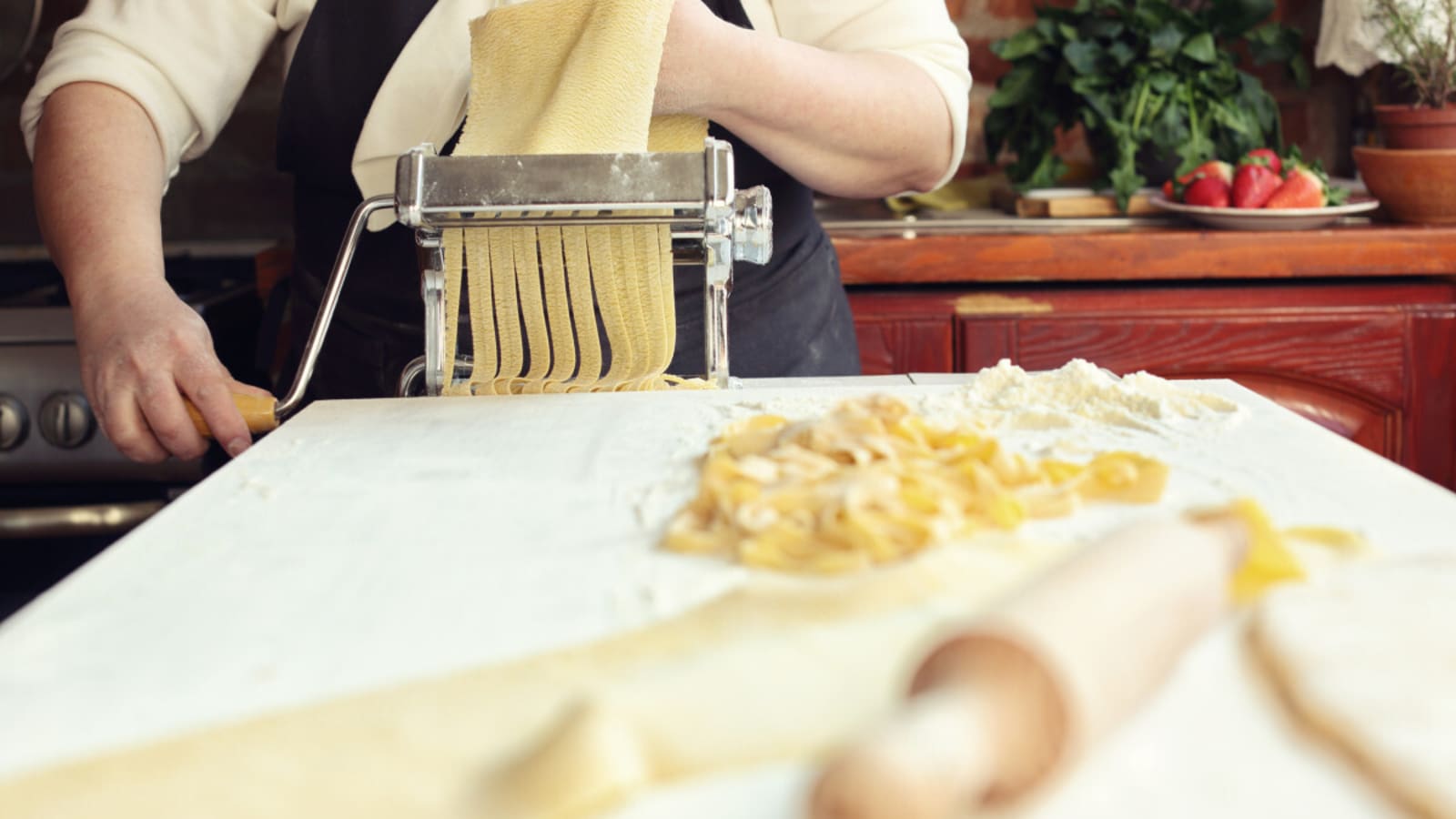
If you've ever heard that a pasta maker should never be cleaned, as the remnants of flour and pasta dough somehow "season" the machine... don't listen. It's a dreamy idea for the sake of easy kitchen clean-up. Though toxic dough is a rare occurrence, this misconception can lead to hygiene issues in your homemade pasta and affect the finished product, particularly when using the thinner settings. Bits of dough can keep the mechanism from rolling easily and it can even clog the machine which is a pain for manual pasta makers and a real nightmare for electric machines. Keeping your machine clean the right way is the best way to keep it working for years to come.
How often should you clean your pasta maker?
It’s recommended to clean your pasta maker after each use, especially if you use it frequently. Not doing so can cause pieces of dough to harden inside the machine, which can interfere with its function and potentially introduce contaminants into your fresh pasta. For those who make pasta occasionally, a thorough cleaning after each session should suffice. Those who use their pasta maker daily might benefit from a quick wipe-down with the rollers on the widest setting after each use to brush away dry dough, and then work in a thorough cleaning of the entire machine once a week.
Tools and Materials You'll Need
- Soft cloths
- Small dry brush (e.g., a pastry brush or a toothbrush)
- Wooden or plastic scraper
- Compressed air can (optional)
- Warm water (for electric pasta machines only)
- Mild dish soap (for electric pasta machines only)
- Drying rack or clean towel
Cleaning a Classic Manual Pasta Machine
-
Disassemble the machine. Carefully disassemble any removable parts, such as the rollers and cutters. Consult the user manual if you're unsure how to do this.
-
Brush away loose flour and dough. Use a small cleaning brush to dust away dough remnants and loose flour from all surfaces. Pay particular attention to the nooks and crannies where dough might have stuck.
-
Scrape off stubborn residue. If there is any hardened dough stuck to the machine, use a wooden or plastic scraper to gently remove it. Avoid using metal tools as they may scratch the surface.
-
Wipe down the machine. Use a dry or slightly damp soft cloth to wipe down the machine. Be careful not to use too much water, as moisture can cause rust and damage the machine's components.
-
Use compressed air. For areas that are hard to reach, a can of compressed air can help blow out any remaining flour or excess dough.
-
Reassemble the machine. Once the machine is clean and dry, reassemble it. Store the machine in a dry place, covered if possible, to protect it from dust.
Cleaning and Maintaining an Electric Pasta Maker
-
Unplug the machine. Make sure the machine is unplugged before you begin any cleaning process to avoid electric shocks or damage.
-
Disassemble removable parts. Remove any detachable parts, such as the mixing paddle, extruder, and any dough cutters. These can usually be cleaned separately.
-
Wipe down the machine with soap. Use a damp cloth with mild dish soap to clean the exterior of the machine body. Avoid getting water into any electronic components.
-
Clean the removable parts. Wash the removable parts with warm water and mild dish soap. Use a brush to clean any small crevices where dough may have become lodged.
-
Dry completely. After cleaning, ensure all parts are thoroughly dried before reassembling. Any moisture left can cause rust or affect the machine's performance.
-
Reassemble and store. Once everything is dry, reassemble the machine. Store it in a cool, dry place, preferably covered to avoid dust accumulation.
FAQ
How do I remove hardened dough from my pasta maker?
If dough has hardened inside your pasta maker, avoid using metal tools to scrape it off, as they could scratch the machine. Instead, use a wooden skewer or plastic scraper as a cleaning tool to gently dislodge the dough scraps. For the easiest removal, let dough residues dry completely, as bits of dough will come off more easily once it's fully hardened.
Can I wash my pasta maker in the dishwasher?
No, you should not wash your pasta maker in the dishwasher. The intense heat and moisture can damage both classic and electric pasta machines. You shouldn't even submerge your dirty pasta maker in water. Instead, clean the machine by hand with no more than a barely damp cloth to ensure its longevity.
Why is it important to dry my pasta maker thoroughly?
Drying your pasta maker thoroughly after cleaning is crucial to prevent rust from forming on metal components and to avoid moisture from getting into the electrical parts of an electric pasta machine. Wipe your machine down with a dry cloth and then let the machine dry in the air before putting it away. Proper drying ensures that the machine remains in good working order for longer.
More must-reads:
- A.J. Brown, QB drama and cap crunches: The hottest 2026 NFL offseason issue for every team
- Ex-Ohio State star, Jets first-round pick Darron Lee facing first-degree murder charge; death penalty in play
- The 'Super Bowl winning coaches' quiz
Breaking News
Trending News
Customize Your Newsletter
 +
+
Get the latest news and rumors, customized to your favorite sports and teams. Emailed daily. Always free!








